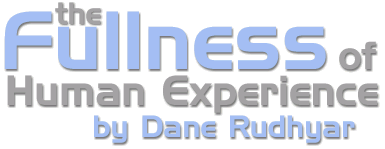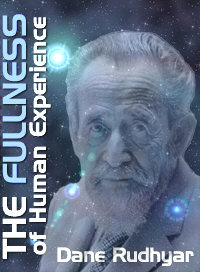 |
| Home | Bio | Art | Music | Literature | Civilization & Culture | Philosophy of Wholeness | Theosophy & Spirituality | Astrology |

CHAPTER SIX
The Formative and Separative Operations of Mind - 6 The discursive and argumentative mind When a living organism, operating strictly at the level of biological organization, reacts to a situation, its reactions are determined by instinctual patterns characterizing the entire species to which it belongs. In computer terms, the organism is programmed to react in a specific way. Generally speaking, this way is the best which the desire for survival, self-replication, and expansion inherent in the stage of organization called life has yet found to fulfill itself in terms of what is possible for that particular biological species. The organism cannot choose another type of response. Whatever programmed the instinctual reactions left no other available option. From the point of view of the philosophy of operative Wholeness, the programmer is mind - mind operating as the formative power of biological evolution by impressing upon the sensitive material available in the biosphere definite structural patterns of action and reaction embodying archetypal formulas of relationship between cells and organs. When, however, the great reversal of the cyclic motion of being occurs at the symbolic Noon, and a new balance of power between the principles of Unity and Multiplicity begins to operate, the new situation introduces a radically different type of possibility: the possibility of multiple options and of personal choice. The human person may use his or her will in an at least relatively or partially free manner. But this simply means that the person is able to bring to the experience of a new situation a subjective factor — a "desire" for or against — which is not determined by either a biologically set program of instinctual reactions, or a family, religious, and sociocultural tradition. Actually, however, any human person is first a living organism belonging to the genus homo sapiens, then a member of a particular family, class, culture, and social organization. The human being is therefore at first partially but inevitably programmed by the generic mind of his or her race and biopsychic ancestry, and by the collective mind of his or her culture. Yet being human, this person is able to disregard or oppose to some extent the instinctual reactions of his or her biological nature, and/or the imperatives of family and class traditions stamped since birth upon the interconnecting patterns of neuro-cerebral activity. The person can make choices on a personal basis as a singularity of being. He or she can choose to act in terms of what he or she desires (or fears) to experience. Choosing to act, however, implies the selection or the working out of a succession of more or less clearly defined acts or processes. The subjectivity factor — the newly emerging desire or the sharply focused and concretizing will — may be present; but there is a gap between a desire and the concrete acts involved in its fulfillment. Only mind can bridge this gap. At the biological level of organization, mind does the bridging according to the archetypal patterns produced by the celestial Hierarchies. The mental processes are not free even though mind may seem to act by directly, spontaneously, and randomly reacting to the nature of the energies operating in the biosphere. But when the development of personhood begins and the subjectivity factor in human experience is able to detach itself ever so slightly from the situation a human being has to meet — only then can mind operate in relation to subjective desires having a "personal" character. The desires are "personal" in the sense that they are not totally determined by specific archetypal and/or cultural patterns. The essential character of personhood is revealed in the immense multiplicity of possibilities it encompasses. It must encompass them all because it is the "Solution" the Godhead envisioned for an equally great variety of ancient failures and therefore of karmic patterns to be neutralized. It would be impossible, however, to pass at once from the state of totally compulsive biological organization to that of inherently free, autonomous, and responsible individual selfhood. It is equally impossible for the archetypally directed biological and generic mind to be transformed in one step into the mind of a totally individualized person. An intermediary phase of human evolution has been (and remains) necessary: the stage of culture. From the foundations of generic biological organization a collective type of sociocultural organization has had to emerge. It has been made possible primarily by the development of language and of other systems of symbolic intracultural communication, thanks to the development of the forebrain and of an immense number of neuro-cerebral interconnections. This "new brain" contains billions of cells which, though interrelated into many thousands of operative groups, seem to have a relative individuality of their own. In their totality these cells may be considered the many aspects of an all-human potentiality of personhood; thus they constitute or make possible the entire solution to the problem of karma envisioned by the Godhead. Though this solution is potentially operative at the highest levels of earth-matter in the prototype of personhood, the Supreme Person, it has to work out at the more material levels of existence where the karma of past "failures of nerve" or misdeeds have to be met consciously, without evasion, yet without engendering new disharmonic reactions. Today, all but a relatively few human beings operate at the level of existence categorized as "personal." Yet this qualificative is ambiguous because the development of personhood has to pass through several phases; and in a forthcoming chapter I shall speak of several fundamental types of crises leading from one phase to the next Each phase can be characterized by a specific type (or level) of subjective desire; and each of these desires calls upon the mind factor to provide a technique of operation assuring its satisfaction. The ego-mind, in its primitive and crude forms, is the attempt by a newborn and growing child to find the most satisfying and pleasure-producing method of adapting its particular biological needs and relatively unique temperament to the pressures and demands of the familial and sociocultural environment. A particular strategy has to be devised — flexible or rigid as the case may be — in order for the child and adolescent to define his or her stand (and probably as a result, his or her status) within the biological family-group, the peer-group at school, and the social class of people to which the youth soon realizes he or she belongs. Mind is the strategist — but mind subservient to a desire-factor having become aware of its potential ability to partially control daily situations. One can only control that from which one has to some extent become detached. In terms of the subjectivity factor (desire) one can speak of detachment, because it seems that an enfolding matrix-like structure to which one was attached is letting go, unable to resist the challenge of a new type of emergent energy. In terms of the mind's activity, subjective detachment becomes separation. This state of separation is objectively perceived and assessed as an incontrovertible fact in a new kind of situation. Chaos (that is, the total lack of activity of the formative, order-producing power of mind) would be produced by a sudden, radical, and complete separation from the level of mental activity until then dominated by the archetypal power of instinct. This condition of chaos is avoided because a new type of organization (embodied in its prototype, the Supreme Person) enters the planetary stage. Moreover, the shift from the long-dominating principle of biological organization, "life," to the new principle, personhood, occurs very slowly. It occurs through gradual development of a long series of cultures whose collective patterns of order act as overtones of the fundamental tone sounded by biological processes. As these culture-building overtones are forms of organization less compulsive than biological drives, their power can be more easily challenged and overcome. What overcomes these drives is still the personhood principle of organization, but personhood in its individualized aspect: the individualized person operating, making choices, acting, and responding to other persons, thus dealing with karma as a singularity of being. Only where this state of individualization is achieved (which is not what Jung meant by "individuation") is personhood truly operative. By permission of Leyla Rudhyar Hill Copyright © 1986 by Leyla Rudhyar Hill All Rights Reserved.  Web design and all data, text and graphics appearing on this site are protected by US and International Copyright and are not to be reproduced, distributed, circulated, offered for sale, or given away, in any form, by any means, electronic or conventional. See Notices for full copyright statement and conditions of use. Web design copyright © 2000-2004 by Michael R. Meyer. All Rights Reserved. |
 |
